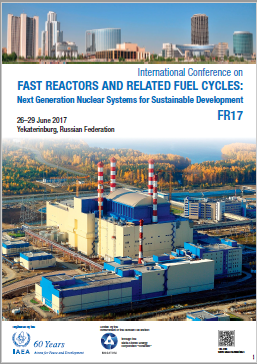Speaker
Dr
Alexander Chebeskov
(IPPE)
Description
Long-term development of nuclear power assumes using energy resources of uranium-238 and thorium-232. The valuable property of fast reactors (FR) is their possibility to involve fertile isotopes uranium-238 and thorium-232 into nuclear fuel cycle (NFC). The use of regenerated products in FRs, received during reprocessing of spent fuel (SF), will provide closure of a NFC.
Currently limited cases of partial closure of NFC for thermal reactors (TR) was organized in Russia and France by reusing regenerated uranium in RBMK reactors and plutonium in PWRs in Western Europe. The full-scale closure of a NFC includes two main technologies – reprocessing of SF and fabrication of fresh fuel using regenerated nuclear materials. During these technological operations large amounts of fissile isotopes will be circulated in NFC and this point should be taken into consideration in order to provide nonproliferation regime and physical protection of nuclear materials. It is especially important for FRs and their NFC where concentration of fissile materials is several times higher as compared to TRs and their NFC.
During expansion development of NP in the world it is predicted that many countries will have intension to use FRs. The nuclear states, according to the NPT, are obliged to provide to non-nuclear states a complex of services for peaceful use of nuclear energy including the use of FRs. And the non-nuclear states are obliged to fulfill requirements of non-proliferation regime and physical protection of nuclear materials. Therefore it is expedient and very important to follow the IAEA safeguards at an early stage of development of new nuclear reactor designs and appropriate technologies of nuclear fuel cycle – so-called Safeguards by Design. At a stage of reaching commercial attractiveness of FRs in Russia the important issue will be raised in the country concerning the possibility of export FRs to other countries.
The issues of proliferation resistance of FRs and related nuclear fuel cycles due to diverse of nuclear knowledge, technologies, and nuclear materials of civilian NP for other purposes are discussed in the paper. Features of a closed NFC to maintain global non-proliferation regime in comparison with open NFC of thermal reactors are presented.
Optional versions of start FRs with the use both of plutonium and enriched uranium are considered. Features of on-site deployment of NFC infrastructure in comparison with centralized one for FRs are given from nonproliferation point of view.
Country/Int. Organization
Russian Federation
Author
Dr
Alexander Chebeskov
(IPPE)

